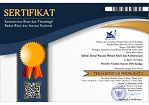Reformasi zakat pertanian (Studi di dusun Jeblok desa Brudu kecamatan Sumobito kabupaten Jombang)
Abstract
Keywords
Full Text:
PDFReferences
Abror, Indal. “Beban Ekonomi Kaum Petan: Menghitung Kembali Ketentuan Zakat Hasil Pertanian”. Jurnal Aplikasi Ilmu-ilmu Agama. Vol. VI. No. 1. 2005.
Asnaini. Zakat Produktif dalam Perspektif Hukum Islam. Yogyakarta: Pustaka Pelajar. 2008.
Mahfudh, Sahal. Nuansa Fiqih Sosial. Yogyakarta: Pustaka Pelajar. 1994.
¬____________. Dialog Problematika Umat. Surabaya: Khalista. 2014.
Mas’udi, F. Masudi. MenggagasUlang Zakat. Bandung: Mizan. 2005.
Maula, Bani Syarif. Sosiologi Hukum Islam di Indonesia: Studi tentang Realitas Hukum Islam dalam Konfigurasi Sosial dan Politik. Malang: Aditya Media Publishing. 2010.
Mukhlisin, Ahmad. “Kajian Hukum Islam Terhadap Dinamika Pelaksanaan Zakat Padi (Studi Di Kampung Sukajadi Kecamatan Bumiratu Nuban)”. Mahkamah. Vol. 1. No. 2. 2016.
Munir, Misbahul et.al. Studi Hukum Islam. Surabaya: UIN Sunan Ampel Press. 2014.
Noor, Zainul Bahar. “Zakat dan Perekonomian Nasional”, Harian Pelita. 1993.
Qaradhawi, Yusuf. Teologi Kemiskinan. Yogyakarta: Mitra Pustaka. 2002.
_____________. Membumikan Syariat Islam: Keluwesan Aturan Ilahi Untuk Manusia. (Terj.). Bandung: Mizan. 2003.
Romdhoni, Abdul Haris. “Zakat dalam Mendorong Pertumbuhan Ekonomi dan Pengentasan Kemiskinan”. Jurnal Ilmiah Ekonomi Islam. Vol. 3. No. 1. 2017.
Soekanto, Soerjono. Pokok-Pokok Sosiologi Hukum. Jakarta: Raja Grafindo Persada. 1994.
Junaidi, Suyitno Heri & M. Adib Abdushomad (e.d). Anatomi Fiqh Zakat: Potret&Pemahaman Badan Amil Zakat Sumatera Selatan. Yogyakarta: Pustaka Pelajar, 2005.
Widodo, Arif. “Kontekstualisasi Zakat dan Perubahan Sosial (Analisis Transformasi Sosial dengan Pendekatan Wacana Keagamaan)”, Esensia, Vol. XIV, No. 2. 2013.
Zuhaylī (al), Wahbah. al-Fiqh al-Islām wa Adhillatuh. Damaskus: Dar al- Fikr. t.t.
Wawancara dengan Hadi Saifuddin, 2017.
Wawancara dengan Heru Fuazzin, 2017.
Wawancara dengan Humaidi, 2017.
Wawancara dengan Mas’ud, 2017.
Wawancara dengan Maulan, 2017.
Wawancara dengan Sarbini, 2017.
Wawancara dengan Usman, 2017.
DOI: https://doi.org/10.18326/ijtihad.v19i2.185-203
Refbacks
- There are currently no refbacks.

This work is licensed under a Creative Commons Attribution-ShareAlike 4.0 International License.
Ijtihad: Jurnal Wacana Hukum Islam dan Kemanusiaan by http://ijtihad.iainsalatiga.ac.id/ is licensed under a Creative Commons Attribution-ShareAlike 4.0 International License







